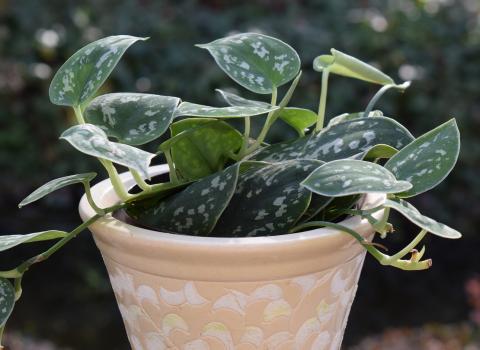Which Fertilizer is Best for Houseplants?

Fertilizing houseplants, or any containerized plant for that matter, is a task that is often overlooked. Although many popular houseplants are relatively slow growing and have fairly low nutrient requirements, they still need a fertilizer boost periodically for healthy growth. Most soilless potting mixes contain few, if any, plant nutrients, and those that do contain added fertilizer will eventually be exhausted. If you notice that your plants are starting to look pale, it’s probably time to fertilize.
Fertilizer Nutrients
Which fertilizer product is best for you depends mainly on what you’re growing. Different fertilizers contain various percentages of the three essential macronutrients: nitrogen, phosphorus, and potassium. Suitable houseplant fertilizers will contain all three macronutrients, although different percentages will be better in some situations than others. In general, foliage plants grow best with fertilizers that are high in nitrogen, while flowering plants tend to prefer those that have more phosphorous. There are many specialty houseplant fertilizers that work quite well for specific plants. However, a balanced fertilizer such as 10-10-10 (10% nitrogen, 10% phosphorus, 10% potassium) is usually suitable for the majority of common houseplants.
Fertilizer Formulations
Fertilizers can come in a few different forms: concentrated liquids and water soluble granules that can be diluted with water and applied to the soil, or coated pellets that can be mixed into the soil and break down slowly over time. They can also be derived from either chemical or organic sources, and which you decide to use depends largely on personal preference. Organic fertilizers contain plant nutrients in lower concentrations, and it takes time for nutrients to become available. Fish emulsion fertilizers are a popular choice, but be warned, they do come with a smell that many people find unpleasant. Synthetic fertilizers, on the other hand, have much higher percentages of nutrients that are immediately available to plants. However, make sure to carefully read the label and apply only as directed, because over-application can quickly damage plants.
Got questions? The Ask UNH Extension Infoline offers practical help finding answers for your home, yard, and garden questions. Call toll free at 1-877-398-4769, Monday to Friday, 9 a.m. to 2 p.m., or e-mail us at answers@unh.edu.
Do you love learning about stuff like this?
SUBSCRIBE TO Granite State Gardening newsletter
Got questions? The UNH Extension Yard and Garden Infoline offers practical help finding answers for your yard and garden questions.
Call toll free at 1-877-398-4769, Monday to Friday, 9 a.m. to 2 p.m., or fill out webform.

